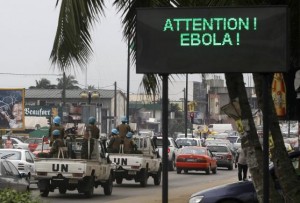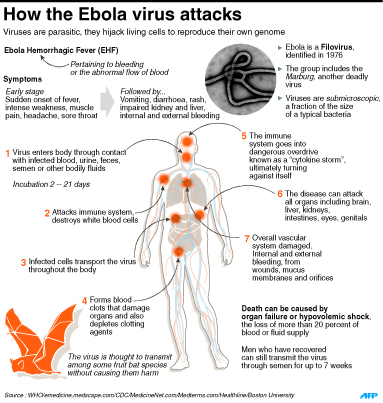Sunday Times 2
Focus on Poverty: The hidden tragedy behind Ebola
The West Africa Ebola outbreak is now a “public health emergency of international concern”, according to the WHO.
In among some alarmist reportage of the outbreak it is not too hard to find expert and balanced comment from the WHO, medical and development specialists.

A U.N. convoy of soldiers passes a screen displaying a message on Ebola on a street in Abidjan August 14 (Reuters)
The media reports are consistent on the basic facts. This is the deadliest and longest-lasting outbreak of Ebola recorded. There is no known cure for the disease. Once one is infected with the Ebola virus, survival rates are low and death from it is horrific. However, most poor people, even in those countries most affected by the outbreak – Guinea, Liberia, Nigeria and Sierra Leone – are still much more likely to die of something else.
But why West Africa, and why now? In spite of all the articles on fruit bats, the natural host of the virus, and the potential role that disruption of their forest habitat may play in increasing transmission, I have not seen an explanation that convincingly answers those questions. Perhaps no one could have foreseen or prevented the outbreak.
Yet people in rich countries should ask why we are suddenly so bothered about Ebola, but not the Africans who will die today of diarrhoea-related causes, malaria, Lassa fever, sleeping sickness or many other illnesses.
 Presidential involvement in the response to the crisis (whether from the West Wing or West Africa), global coverage on outlets such as the BBC and CNN, and declarations of “states of emergency” with troops round airports all push the issue up the news agenda.
Presidential involvement in the response to the crisis (whether from the West Wing or West Africa), global coverage on outlets such as the BBC and CNN, and declarations of “states of emergency” with troops round airports all push the issue up the news agenda.
But does this help an effective public health response? Where were the big politicians when Ebola was seen as an issue affecting rural Africans? It has, after all, been known about since the 1970s. And, as early as June, Médecins Sans Frontières/Doctors Without Borders was saying that it had reached the limits of what it could do about emerging cases.
The primary tragedy is that Ebola has overwhelmed healthcare systems that were already failing the poor. The people of Guinea, Liberia and Sierra Leone needed adequate healthcare services before this outbreak happened. Of course, a healthcare system that cannot cope with more prevalent diseases cannot cope with an extraordinary outbreak like this, either. Progress in developing countries on the health-related Millennium Development Goals shows that improving health systems is affordable and achievable.
Surely the twenty-first century response to the diseases of the poor should, as well as addressing the immediate Ebola crisis, be to strengthen health systems in the poorest countries.
(Courtesy SciDev.net)
| Evidence suggests Ebola toll vastly underestimated: WHO
CONAKRY (Reuters) – Staff with the World Health Organisation battling an Ebola outbreak in West Africa see evidence the numbers of reported cases and deaths vastly underestimates the scale of the outbreak, the U.N. agency said on its website on Thursday. The death toll from the world’s worst outbreak of Ebola stood on Wednesday at 1,069 from 1,975 confirmed, probable and suspected cases, the agency said. The majority were in Guinea, Sierra Leone and Liberia, while four people have died in Nigeria. The agency’s apparent acknowledgement the situation is worse than previously thought could spur governments and aid organisations to take stronger measures against the virus. “Staff at the outbreak sites see evidence that the numbers of reported cases and deaths vastly underestimate the magnitude of the outbreak,” the organisation said on its website. “WHO is coordinating a massive scaling up of the international response, marshalling support from individual countries, disease control agencies, agencies within the United Nations system, and others.” International agencies are looking into emergency food drops and truck convoys to reach hungry people in Liberia and Sierra Leone cordoned off from the outside world to halt the spread of the virus, a top World Bank official said. In the latest sign of action by West African governments, Guinea has declared a public health emergency and is sending health workers to all affected border points, an official said. An estimated 377 people have died in Guinea since the outbreak began in March in remote parts of a border region near Sierra Leone and Liberia. Guinea says its outbreak is under control with the numbers of new cases falling, but the measures are needed to prevent new infections from neighbouring countries. “Trucks full of health materials and carrying health personnel are going to all the border points with Liberia and Sierra Leone,” Aboubacar Sidiki Diakité, president of Guinea’s Ebola commission, said late on Wednesday. As many as 3,000 people are waiting at 17 border points for a green light to enter the country, he said. “Any who are sick will be immediately isolated. People will be followed up on. We can’t take the risk of letting everyone through without checks.” Sierra Leone has declared Ebola a national emergency as has Liberia, which is hoping that two of its doctors diagnosed with Ebola can start treatment with some of the limited supply of experimental drug ZMapp. Canada’s Tekmira Pharmaceuticals Corp is also exploring making more of its experimental Ebola treatment, Chief Executive Officer Mark Murray said. Nigeria also has declared a national emergency, although it has so far escaped the levels of infection seen in the three other countries. That task is harder because health services have been stretched to the breaking point and mistrust of health workers among some rural communities is high. In addition, 170 healthcare workers have been infected and 81 have died. A Liberian government document seen by Reuters shows the strain on its health ministry as it confronts the emergency. “The case investigation team only has one vehicle so they can’t get out and then there’s the issue of no space at the ETU (Ebola Treatment Unit) to bring patients,” it said. Ebola is one of the world’s most deadly diseases and kills the majority of those infected. Its symptoms include internal and external bleeding, diarrhoea and vomiting. The U.S. State Department ordered family members at its embassy in Freetown to depart Sierra Leone because of limitations on regular medical care as a result of the outbreak. U.S. President Barack Obama has discussed the outbreak with the presidents of Liberia and Sierra Leone, the White House said. Among the signs of the regional economic impact, Ivory Coast will not allow any ships from Guinea, Sierra Leone and Liberia to enter its port at Abidjan, according to a port statement. Fewer passengers are arriving at Ivory Coast’s main airport from Freetown, Conakry and Monrovia because of the virus leading to a shortfall of about 4,000 passengers a month, Abdoulaye Coulibaly, chairman of Air Cote d’Ivoire, told Reuters. Ivory Coast and its eastern neighbour, Ghana, have recorded no cases of Ebola. Ghana’s government said it would step up its funding for preventative health and impose a moratorium on international conferences for three months as a precaution. Beyond the immediate impact, Africa faces a problem of perception over Ebola, even though many countries are remote geographically, economically and culturally from those suffering the outbreak. In one example, Korean Air Lines Co Ltd said it will suspend flights to and from Nairobi, Kenya, from Aug. 20 to prevent the spread of the virus. |

